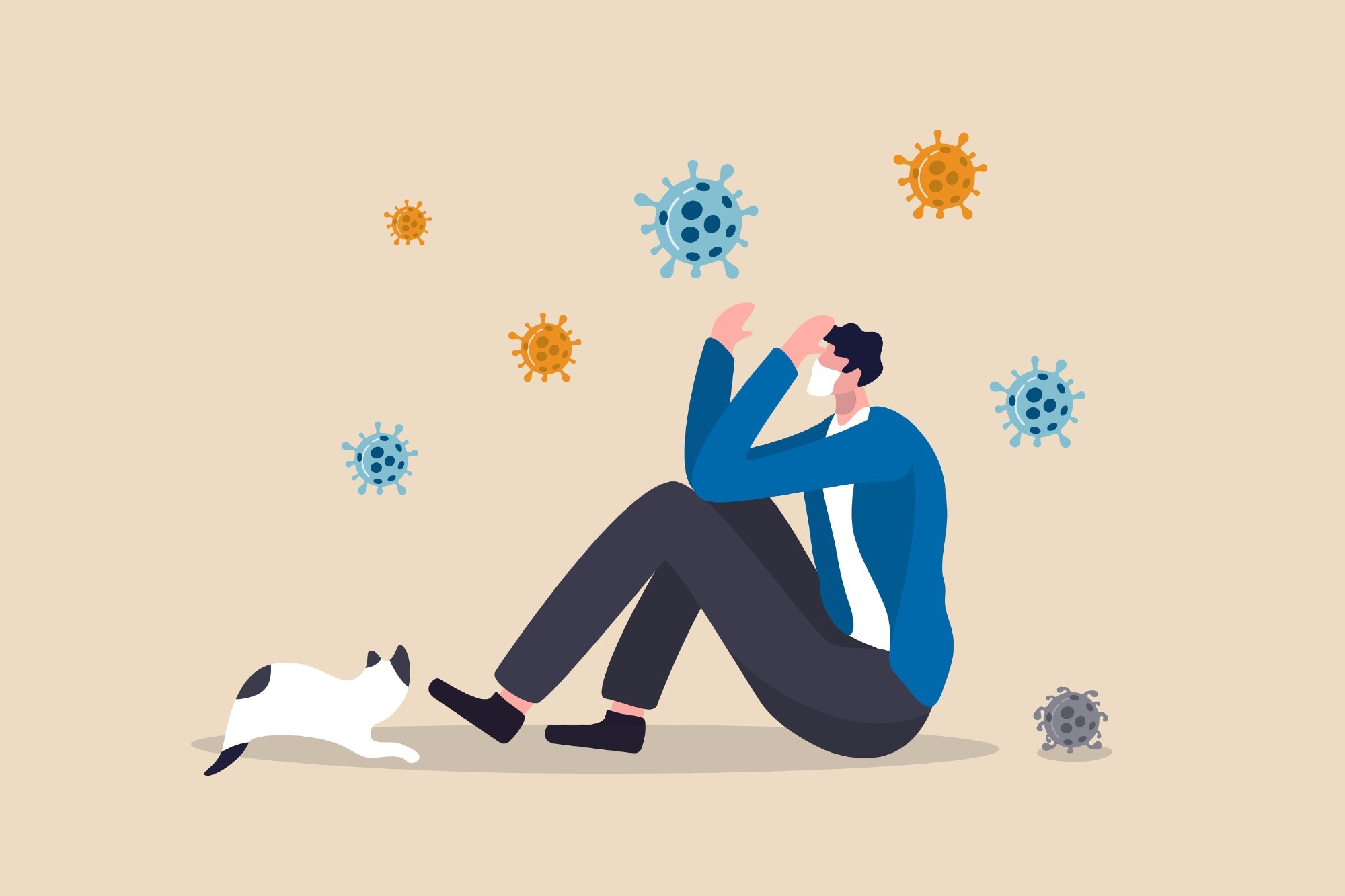PASC, also known as long COVID, is defined as the persistence of COVID-19 signs/symptoms beyond four weeks from the initial onset of the disease. Fatigue, dyspnea, brain fog, loss of smell/taste, depression, and digestive issues are common symptoms of long COVID. PASC is associated with an inability to return to work and lower quality of life.
Systematic reviews primarily involving hospitalized COVID-19 patients report that 54% to 73% might experience long COVID. Psychological distress correlates with increased clinical severity and more extended periods of acute respiratory tract infections, and only three studies have investigated psychological distress as a risk factor for post-COVID-19 syndrome.
 Study: Associations of Depression, Anxiety, Worry, Perceived Stress, and Loneliness Prior to Infection With Risk of Post–COVID-19 Conditions. Image Credit: eamesBot /Shutterstock
Study: Associations of Depression, Anxiety, Worry, Perceived Stress, and Loneliness Prior to Infection With Risk of Post–COVID-19 Conditions. Image Credit: eamesBot /Shutterstock
About the study
In the present study, researchers assessed whether pre-infection psychological distress, including anxiety, depression, loneliness, worry, and perceived stress, were associated with the risk of developing PASC. Participants from three extensive ongoing longitudinal studies were invited to complete an online questionnaire on COVID-19.
After that, respondents were administered monthly surveys. Surveys were administered quarterly from August 2020 until November 3, 2021. The frequency of anxiety and depressive symptoms in the past two weeks was evaluated with a four-item patient health questionnaire (PHQ-4). This comprised a two-item generalized anxiety disorder scale (GAD-2) for anxiety and a two-item depression measure (PHQ-2).
Worry about COVID-19 was also examined. Further, two additional distress types were analyzed in those who were not active health care workers (HCWs). The four-item perceived stress scale (PSS-4) assessed the frequency of stress in the past month. The three-item loneliness scale examined the frequency of feeling isolated, left out, or lacking companionship. SARS-CoV-2-positive test results, COVID-19 symptoms, and hospitalization were self-reported.
PASC was assessed in the last questionnaire 336 days after baseline. Sociodemographic factors, types of distress at baseline, and COVID-19 severity risk factors were compared between participants who responded to PASC items and those who did not. Relative risks (RRs) and 95% confidence intervals (CIs) for PASC were estimated using a generalized estimating equation.
Findings
Most of the 54,960 participants were White (96.5%), females (96.6%), and 38% were active HCWs, with a mean age of 57.5 years. There were 3193 participants with a positive result for the SARS-CoV-2 test over 19 months of follow-up. At baseline, subjects who had probable anxiety (GAD-2 score of ≥ 3) or depression (PHQ-2 score of ≥ 3) were younger, more likely to be active HCWs, and had asthma.
Individuals worried about COVID-19 were more likely to be females, have asthma, and be from racial and ethnic minorities. Participants with probable depression, anxiety, loneliness, who were worried about COVID-19, or in the highest quartile of perceived stress were more likely to have a body mass index (BMI) of ≥ 35. Approximately 44% of those with a positive SARS-CoV-2 test result reported PASC. Among them, 86.9% had symptoms longer than two months.
Common symptoms were fatigue (56%), impaired smell/taste (44.6%), dyspnea (25.5%), confusion/brain fog/disorientation (24.5%), and memory complications (21.8%). All types of psychological distress were significantly associated with an elevated risk of PASC. Participants with multiple types of distress at baseline had an increased risk of developing PASC. Moreover, researchers investigated the relationship of pre-infection distress with symptoms and impairment among participants reporting PASC.
All COVID-19 symptoms, except for impaired smell/taste and persistent cough, were more prevalent in those with distress than those without. Participants with distress at baseline had more symptoms of long COVID. Symptoms of anxiety, depression, perceived stress, and worry about COVID-19 were associated with a 25% to 51% higher risk of experiencing symptoms that interfered with activities.
Conclusions
The researchers found a strong association between pre-COVID-19 psychological distress and the risk of PASC. On average, at baseline, individuals with at least one distress experienced one additional PASC symptom compared to those without distress. All distress types except loneliness were associated with a higher risk of PASC-related impairment of daily life.
The authors cautioned against interpreting the findings that PASC is psychosomatic because 40% of respondents who reported PASC had no psychological distress at baseline. Moreover, PASC symptoms are considerably different from mental illness symptoms, and over 50% of PASC subjects reported relapses triggered by physical activity, which, contrastingly, is protective against mental illness relapse.
Of note, a majority of the study population was White, female, and HCW, limiting the generalizability of results. In summary, the findings suggest that pre-existing psychological distress increases the risk of developing PASC. Future studies should investigate whether distress-reducing interventions help to prevent or treat PASC.